In autumn, I moved to Brussels for work. This is my fifth move abroad – I know absolutely no one and I’m starting my life pretty much from scratch. Since my employment contract is currently only temporary, my time in Brussels is limited to the next six months. This allows me to experience the city from a more “local” side and get to know its many quirks and oddities. Here are my observations from living in Brussels so far.
Did You Know? Belgium, together with The Netherlands, was part of the former Habsburg Empire. Brussels was chosen as “The Capital of Europe” as it lies halfway between France and Germany, the two dominant powers and driving forces in Europe.
Table of Contents
Living in Brussels
My post is light-hearted content based on my experiences and observations while navigating this new city. I hope that it provides you with various insights into the quirks of living in Brussels, should you also consider moving to the city.
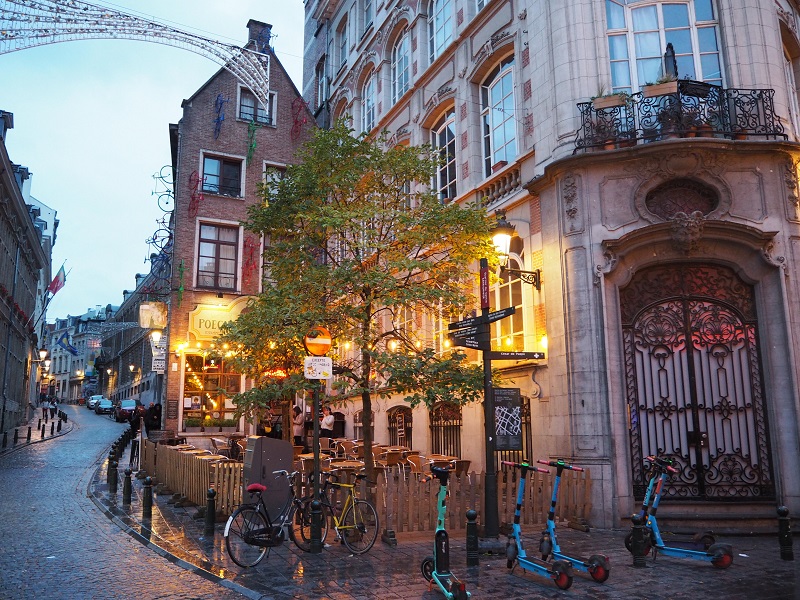
Accommodation In Brussels
Since my current employment contract is only temporary, renting a furnished flat was the best option for me. Although my rent includes all bills, I understand that I am paying slightly more than the average rental cost in Brussels. Still, I think I got a good deal out of it.
If my stay was guaranteed long-term, I would definitely consider renting an unfurnished flat. Then it would make more sense to invest in a proper move including additional furniture and setting up external house & admin amenities. Plus, I doubt right now, that any landlord would have accepted me for an unfurnished apartment given my short stay & circumstances.
AirBnB would have been another option. However, I noticed some problems here. Firstly, I doubt that you are allowed to register with the municipality, and secondly, you would have to pay the city tax.
Before I moved to Brussels, I also looked into renting a flat at an apartment hotel. My idea was to get a similar deal to my flat in Vienna. Unfortunately, the offerings of apartment hotels in Brussels are expensive and the furnishing is often massively outdated. Also, I would have faced the same problem as with an Airbnb rental and would have had trouble registering with the commune.
Tip: If you have the chance and resources, make sure to visit Brussels before your up-coming move and make yourself familiar with the neighborhoods. Ixelles, Saint Gilles, Sablon, Etterbeek and Woluwe-Saint Lambert have good reputations. I also found the Brussels a la carte neighborhood guides provided by the Cultural Information Desk at Saint Gery insightful when I made myself familiar with the city.
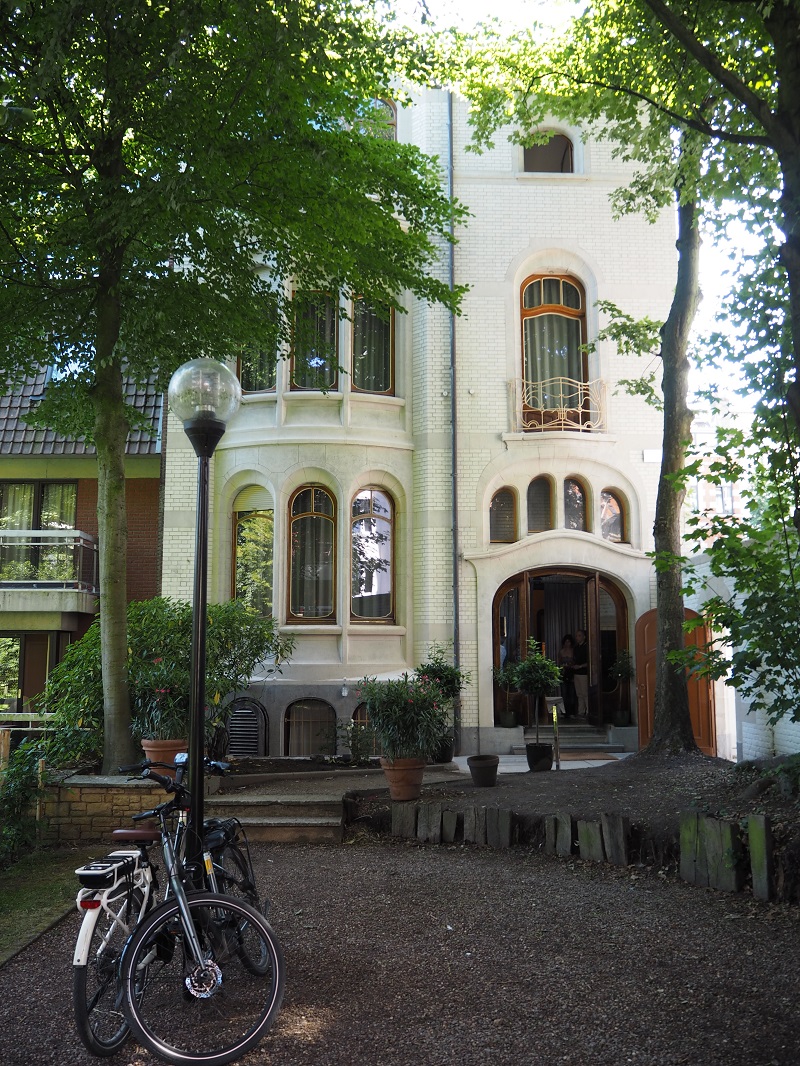
Registration in Brussels
If you work in Belgium or intend to stay here for longer than 90 days, there is a legal obligation to register with the municipality. If you don’t register, you’ll face heavy fines and be in trouble with the tax office if you decide to live in Belgium again on another occasion. Better be safe and follow the rules and administrative procedures.
Each commune has an administrative office that offers various services including local registration. Your community is determined by your postcode, not the area you may live in, e.g. I live in Ixelles, but my postcode is 1000, which means that Brussels City at Rue de Halles 4 is responsible for all of my housing inquiries.
Most communes offer online appointment booking. The service you want to choose is “service étrangers/vreemdeligen dienst” and you can then apply in person for a residency card. The procedure takes a couple of months, so you want to get your registration sorted a few days after you arrive in Brussels. Bring the following documents along for your registration appointment:
- 25€ admin fee
- ID card
- Health insurance
- Work contract
- Tenancy agreement
What about Digital Nomads?
If you work and earn money during your stay in Belgium, you must register as a “worker” with the municipality. You must also register if you plan to stay in the country for more than 90 days. Make sure you stay in one accommodation, as stays of less than 90 days are subject to a city tax, which you would have to pay again if you changed accommodation. The city tax is 4.25€ per day.
Issuing the Belgian residency card will take up to three months. In the meantime, you’ll be given a temporary document, the “annexe 19, demande d’attestation d’enregistrement” (EU citizens) or “annexe 49, document de séjour provisoire” (for non-EU), which includes your National Insurance number. Your registration is followed up with a house visit from the police – the so-called “agent de quartier” inspection.
Make sure your name is fully displayed on your doorbell and letterbox. In case you’re out for work, the authorities will leave a notice for you, and you can arrange a suitable time with them.
At the end of the three months, you’ll receive confirmation of pick-up for your electronic ID residency card. Bring another 25€ to cover the admin fees.
De-Registration at the End of Your Stay
When your stay in Brussels comes to an end, you must deregister. Again, you can book an appointment with the commune, but you would also have to inform the tax office of your new address. Ask for the “Modèle 8” certificate and make sure all authorities have your new address abroad. During your appointment, you’ll have to return your residency card. If you come back a month later and stay again for a pro-longed period of time you would have to go through the entire registration process and costs again. Frustrating, but better doing it the legal way as facing unpleasant fines and criminal offences later on.
The Belgian tax office can be reached via the following email address: p.bru.beheer.gestion@minfin.fed.be
Unfortunately, Belgium, similarly to Finland, has very high taxes and there are next to no exemptions. Even paid internships and work placements have to be declared.
Pro’s
+ Efficient procedure to ensure your stay in Belgium is legal
+ Fast processing at your appointment
+ Residency card is (fairly) easy to get
Con’s
– Long processing time, if you’re only staying for a few months, it gets pointless applying (but you still have to do it)
– It’s mandatory even for EU nationals
– Correspondence only in French & Dutch when the majority of expats are English-speaking
Complex Recycling System
Belgium has a complex recycling system that took me some time to get used to. There are no common bins; instead, residents have to buy different coloured plastic bags from the supermarket and start separating their trash at home. Each waste has a designated collection day, which can be checked upon in your commune’s waste calendar Bruxelles-Propreté. On the day, you simply leave your bags in front of your house, and the bin men will eventually pick them up.

Blue – tins, plastic bottles, drinks cartons
Yellow – paper, cardboard and wrapping/plastic packaging
White – any house waste including bathroom bin, sanitary items & toiletries
Green – gardening waste
Orange – organic waste
There are also several glass container locations across Brussels Localisation which allows disposal even on weekends.
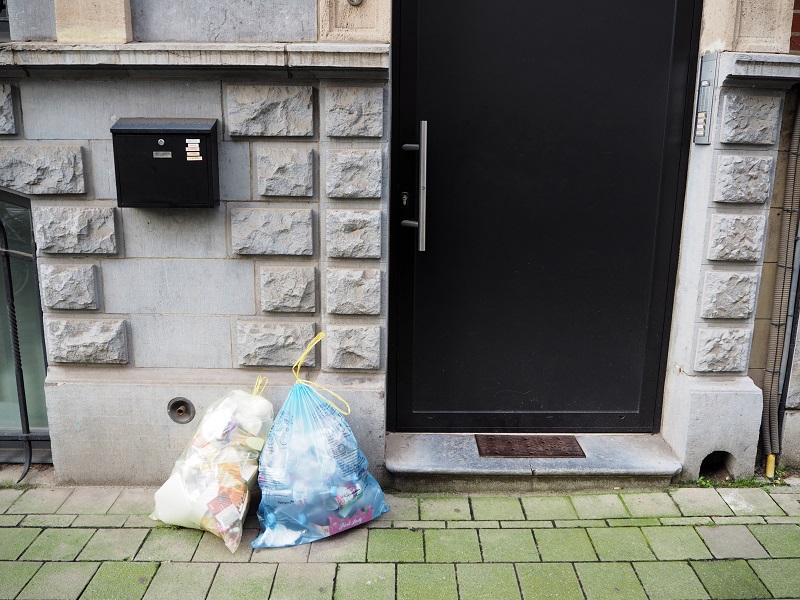
The unkempt look throughout the week with various trash cluttering the streets was a huge turn off for me. It’s not just trash, but as you can see in the picture, the pavements are full of algae and weeds. Let’s not talk about dog poo. In Brussels you can look up (to see the art nouveau buildings) but certainly never ever dare to look down.
Pro’s
+ Effort to separating waste
Con’s
– Not very efficient or environmental-friendly system
– More waste & costs by having to buy plastic bags
– If you miss the collections, you have to store the trash at home for another week
– Unkempt city look everyday of the week. Bin bags often get ripped by wildlife
What is common across many central and northern EU countries has yet to arrive in Belgium: the PET bottle recycling machines. I’ve seen some machines at the supermarket. They are rare and cater only to a very limited amount of drinks packages. Brussels doesn’t recycle PET bottles. However, the city has made plans to implement PET recycling machines to reduce the enormous waste presence in Brussels.
Shopping for Necessities
When I moved and started living in Brussels, I needed a few things for my new household. Unfortunately, Brussels does not have TK Maxx or many multi-buy shops to pick up branded products for a fraction of the price. Everything, and may it even be a rubber spatula, is heavily overpriced.
Household Items: Hema, Flying Tiger, Action and Ikea are the best options to pick up general household items – especially Action is great for cleaning products, toiletries and sweets. I have also been lucky to get a few things from Maison du Monde during their autumn sale in Antwerp, but that was the exception.
Supermarkets: Belgium does not have a supermarket hierarchy, but there is a significant difference in the quality of groceries. In Brussels, the dominant chain is Carrefour. I personally don’t rate Carrefour much, as I had a few disappointing surprises once I got back home, e.g. fruit and vegetables looked fine from the outside but were rotten once cut open or a 3.50€ chicken sandwich with no chicken in it.
Carrefour is also very expensive, e.g. bottle of Febreze costs around 6€, whereas in Action it costs 2.70€. Or I bought a glass measuring cup from Flying Tiger which cost 2.50€ in Antwerp, but 5€ in Brussels.
Be prepared to shop around lots, and compare & check prices. There are even big regional differences.
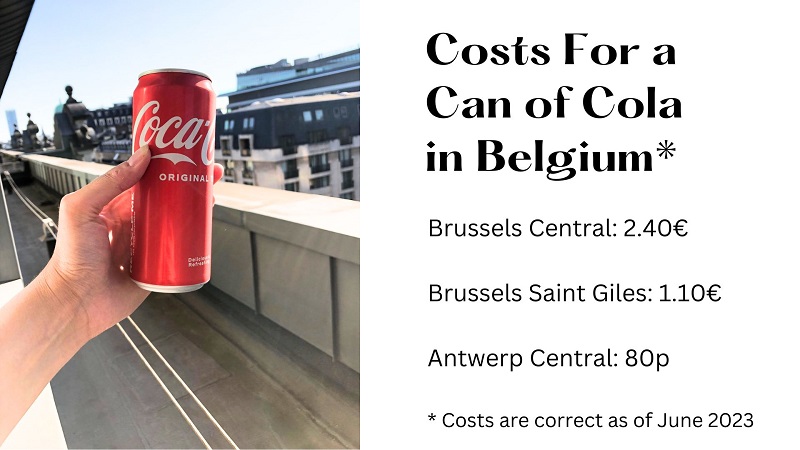
My go-to is Lidl, however, their supermarkets aren’t always easy to reach from where I live. My favourite supermarket in Belgium is the Dutch chain Albert Heijn, which is dominant in the Flemish regions. It has happened a few times now that I picked up a fair amount of food & household supplies on my way back from Antwerp, as many shops are located right by the station and are much easier accessible for me.
Toiletries: The dominant brand is Kruidvat, but their stores are really trashy and often a huge mess. Di! is an acceptable alternative selling e.g. Rimmel London & selected Sephora products, but still not as good as DM or Boots and quite expensive, e.g. a Dove shower gel costs 4.35€, L’Oreal Hair Dye 16€. I found the best alternative to fetch toiletries and household items at a reasonable price is Action.
Belgians have a weird passive-aggression of giving you small change in as many coins as possible, yet when you do it there will be a tantrum.

Con’s
– Not much variety
– Shops are often in inaccessible areas
– Expensive prices and chaotic shops
– 100% more expensive in Brussels compared to other Belgian cities
– Shopping around is needed
– I struggled to find a few common products, e.g. brown rice, chili flakes or light matches
Travelling around Brussels: Tram & Metro System
The public transport system covers Brussels well and you can get around quickly. So far, I’ve never travelled longer than 20 minutes to places such as work or central. The tram & metro system is easily structured and stops are well distributed.
A big plus is the low costs. In Brussels, there are a few monthly or annual subscription models, which are very affordable in comparison to London or Helsinki. For my monthly subscription, which covers the entire tram & metro system in Brussels I pay 50€ (costs as of 2023/24).
The tram & metro, however, are not always reliable. I have often found myself waiting a long time for trains, even though they were forecasted within a few minutes. A 2-minute forecast in Brussels can easily stretch to a 10-minute wait. Trams can change their direction (looking at you Line 8) on a whim. Another frequent occurrence are tram strikes and reduced services so always be prepared to walk/taxi home.

Train travel to other nearby cities is moderately priced, e.g. 16€ return to Antwerp. Weekend prices apply but they are still in the affordable price range. During Christmas and New Year’s, the Belgian train line ran a 50% winter promotion on all-day return tickets, which was super popular.
Longer & international journeys, e.g. Rotterdam or Lille, require more preparation and a generous lead time in advance to secure the best deals. A three-month lead time can get you a 40€ return to Lille or a 60€ return to Rotterdam. A return ticket with Eurostar for London will cost around 80€ ( approximately 44€ one way) or 29€ one way to Paris. You can get a 30% discount on train travel if you book a week in advance.
Pro’s
+ Affordable costs and various subscription models
+ Easy and quick to fetch a local MoBIB card from the info points at stations
+ Short ways, very accessible
+ Extensive network
+ Well-connected to other countries and cities
Con’s
– Leather seats are unhygienic (especially in the summer)
– Trains can change their directions without giving notice to passengers
– 2 minute wait can easily stretch to 10 minutes
– Old trams have very steep stairs and aren’t accessible for everyone. Instead of buttons they have green stripes which need pressing in order to open the doors
– Fare evaders are common. Be careful when you walk through the turnstiles
– Not enough patrolling for security
WiFi in Brussels
The city has a big issue with public WiFi and I often struggled to connect to the networks. All public WiFi is secured with a password, but even if you have the details correct, it is a gamble if the network grants you access. I lost count of how often I tried to connect to the city WiFi. It requires you to sign up with your mobile number. No matter how often I submitted my details, the system would not return a verification code. It did once, after 5 days of me requesting access.
Con’s
– Unreliable networks
– Password secured
– Uncertain access
The Locals & Language
So far my general impression has been positive and most locals have been helpful and accommodating. Nearly everyone I’ve met and interacted with has been friendly and willingly communicated with me in English when I explained that my French is limited. However, I’ve also encountered the opposite.
Even though Brussels is a multilingual city, I met locals who insisted on speaking French only and have let me unmistakably understand my place as a foreigner in their city. These unpleasant people are luckily the minority, but encounters like that can happen if you plan on living in Brussels. Personally, I experienced the Flemish Belgians being more open and relaxed as opposed to Brusselers. Brussels in the end, is a city designed by modern times for work. After my six-month stay, I concluded that learning French is a deal breaker for me.
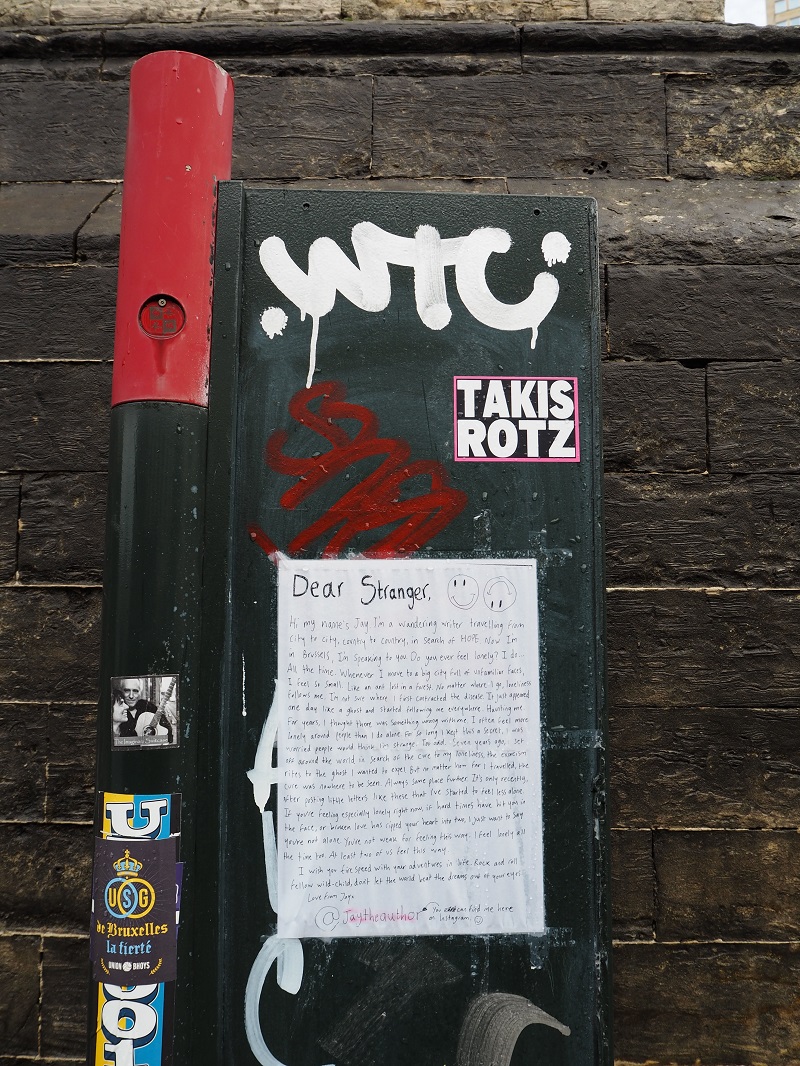
Did You Know? Belgium has a third official language, which is German. However, only a tiny 1% of the population speak it and the German areas are concentrated near the border. Whilst living in Brussels you may hear an occasional announcement in German, most likely at Brussels Centraal station.
Summary of My Experience Living in Brussels
Living in Brussels was only tolerable for me on a temporary basis. Brussels certainly has its edges, and it is not exactly the best-kept city, but it offers opportunities to make your life here moderately liveable – but honestly, not for the long-term. During my stay, I have noticed that the Flemish culture is a much better fit for me. The prospect of having to learn French was one of the deal breakers for me why I couldn’t see myself living in Brussels for much longer.
Other deal breakers were the huge bureaucratic admin surrounding my daily life in Brussels. In the aftermath of my stay I now have to constantly deal with a lot of paperwork and my efforts in moving, living and working there amounting to an overall nonprofitable time for me. If you don’t work for the EU Institutions, Brussels can be tough to handle financially, plus finding your people may be difficult, too. I personally really didn’t like the unkempt and, in places, very rough character of Brussels and prefer cities with a higher living standard, friendlier culture and safety, e.g. Vienna, Leipzig or Antwerp.
Pro’s
+ Compact size. Use the Metro and you can be anywhere within 20 minutes
+ Multilingual & international flair
+ Well-educated locals
+ Medium living costs
+ Great cultural offering and buzz
+ Relaxed lifestyle in comparison to London
Con’s
– Unkempt in places, constant trash
– French-superiority attitude by some locals
– Public WiFi is unreliable
– Weather in winter: it rains for weeks on end
– In places very hilly with limited accessibility
– Big fluctuation of costs
FAQs about Living in Brussels
I understand this is quite a lengthy post, and you may have some quick questions about living in Brussels. You can, of course, always come back to any section of my post and read in more detail what you’d need for your trip. If you have questions or need help, please get in touch and I’m happy to assist.
Is Brussels easy to live in?
Brussels has its many quirks and oddities, which can be testing at times. Brussels has, however, moderate living costs in comparison to other European capital cities. I also value its accessible public transport network and multicultural work environment. Overall, living in Brussels is not as stressful as living in London with my work/life balance fairly intact.
Would I live in Brussels again?
No. If I had the choice of working and living in Brussels again, I would decide against it and prefer residence in laid-back Antwerp instead. Personally I feel the Flemish culture is a much better fit for me, with its moderate living costs and a more accessible life admin. The commute to Brussels is quick, too and I would need the distance from Brussels, which is a very work-focused city after all. Plus housing in Antwerp is much nicer, too.
How expat-friendly is Brussels?
On a short-term basis, Brussels is an expat-friendly city, and you can get by by speaking English only. However, keep in mind, the biggest employer in Brussels is the EU with approximately 60.000 employees across its various institutions offering a very international work environment. This is uncommon for local businesses and companies, who prefer their staff to speak French or Dutch as their markets are The Netherlands and France. If you’re not fluent in either language, your chances for finding full-time work are very slim.
Thanks so much for reading. If you’ve enjoyed my post and would like to support my blog & research, you can do so via Buy Me a Coffee.
Till next time,
Carolin
You may also enjoy reading:
- Is Visiting Bruges In December A Good Idea?
- Ultimate Travel Guide with 30 Things to do in Antwerp
- Is The Eurostar London to Brussels Train Link Worth It?
- Quick Guide to the Antwerp Coffee Culture
- A Complete Brussels 3 Day Itinerary For First Time Visitors
- Brunch in Brussels Guide: the Best and Worst Cafés
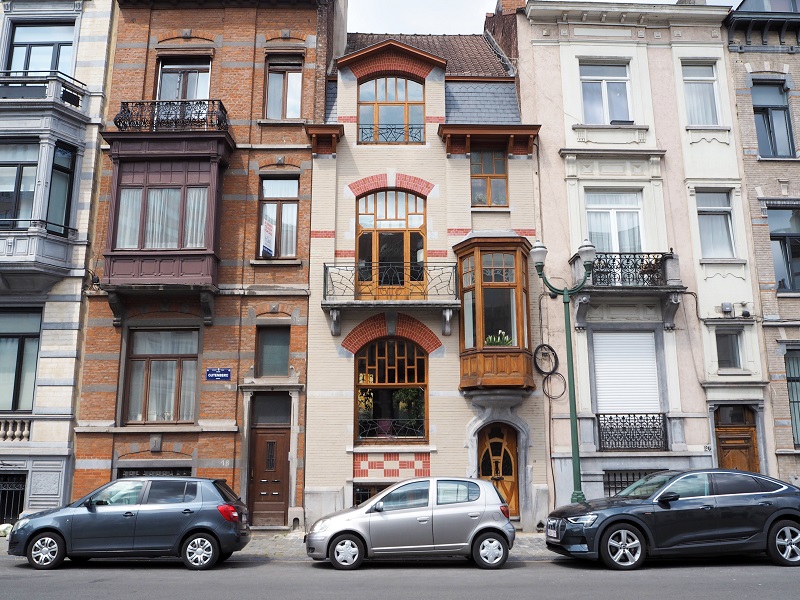

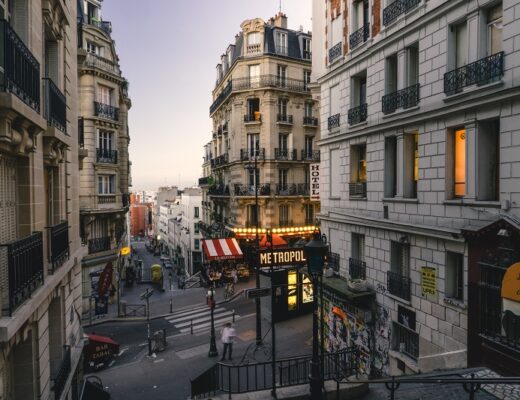

9 Comments
Lyn (aka Jazz)
1 January 2024 at 7:47 pmI really enjoyed your perspective of Brussels even though I am extremely unlikely to move or work abroad. I do, however, enjoy lingering and finding locations to use as a base while I explore on day trips/overnights. This post would be useful for those travellers who like to prepare some of their own meals or plan to use public transportation. The geographical price points were an eye-opener for me and alerted me to watch for that in future planning.
Lyn | http://www.ramblynjazz.com
Mitch
2 January 2024 at 7:57 amWhat an interesting post! We have never lived in another country, so it was fascinating to learn about all the details of day-to-day living, from the registration to the recycling. And even though your post is about moving to and living in Brussels, a lot of the information is really useful for visitors. It’s good to know that the transportation is cheap (much cheaper than the UK!) and that you can get to a good number of places. As a Brit, I’m used to train delays! And it’s nice to hear that the locals are mainly friendly and helpful.
Barry
3 January 2024 at 2:18 amthis is a great insight and personal viewpoint of life, living in Brussels.
It certainly has many pro’s and con’s and the way you have summarised each section with that info is impressive.
There do seem to be a lot of pro’s to living here and your info on how easy/difficult it is to negotiate the paperwork and procedures is invaluable t anyone wishing to follow in your footsteps.
Jan
3 January 2024 at 2:57 pmThe perks of living abroad and fitting in as a transient local 😉 I can realate to this and for starters finding a sense of community and people you can ask for help are a major challenge. And then there’s the language. It’s wonderful that you are able to curate extensively your impressions and observations of a city that you’ve been for a few months. This could be a template for anyone who yearns to live abroad specially in Brussels and the important things that need looking after. The city’s Art Nouveau architecture is a sight to behold #flyingbaguette
Jan – https://flyingbaguette.com/
Emma
5 January 2024 at 2:29 amI really enjoyed visiting Brussels, but as we all know visiting a place and living in it are two very different things. I feel like Vancouver has just as complex a recycling system as Brussels, the only benefit is they all pick up on the same day. So funny about the small change quirk- I used to hate when people did that to me while working in retail but you just accept it and move on. Great perspective of your time in Brussels, the prices do seem higher than many other European cities though
Pam
6 January 2024 at 3:23 amIt’s really interesting the different perspectives of a place when you live there vs. visiting. I would never have known about the recycling. It gives me new insight if we decide to move abroad about the little things that I would need to adjust to when moving – I mostly just think about the language haha.
Angela
15 January 2024 at 11:39 amIt’s very interesting to read a post about a city from the perspective of someone who has lived there for a while and not from the perspective of a tourist.
Living in a place or visiting it are completely distinct things, which give us a different idea of it.
The whole bureaucratic process doesn’t seem too complicated to me… but I’m Portuguese and I’m used to any kind of paperwork taking forever to resolve ahahah
Daniel
5 March 2024 at 6:48 pmWow, I have a three months project in brussels in April, the recycling issue is going to be a bit tricky for me, Thanks for the heads up.
Great post
Riana Ang-Canning
16 May 2024 at 2:12 amThis is such a comprehensive look at life in Brussels! I almost wish I was moving there so I could put all of your excellent knowledge to use. I love that you do the pros and cons – so helpful! And yes, that recycling looks unnecessarily complicated.